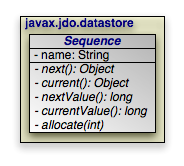
Sequences are simple value generators. As we saw in
Chapter 15, Mapping Metadata, sequences are typically used
to automatically create identity or field values for persistent objects.
At times, however, you may want to use a sequence directly though JDO's
Sequence interface.
public Sequence getSequence (String name);
Chapter 15, Mapping Metadata demonstrated how to define a named
sequence in metadata. The PersistenceManager's
getSequence method retrieves a sequence by its
fully qualified name. If no sequence with the given name exists, the
PersistenceManager throws a
JDOUserException.
![[Note]](img/note.gif) | Note |
|---|---|
In Kodo, you can also obtain the identity sequence of a class
or the value sequence of a field through the
|
public Object next (); public Object current (); public long nextValue (); public long currentValue ();
The Sequence.next method returns the next value
in the sequence. The type of the return value will depend on the sequence
type, as defined in metadata. In JDOR, most JDO sequences are front-ends
for native database sequences, which have integral return types, such as
Long.
Invoking current returns the current sequence
value, which is also typically the last sequence value used. Some
sequences cannot access their current value without incrementing it, or do
not track their current value. Calling current on
these sequences returns null.
nextValue and currentValue
are convenience methods for sequences that return integral
values. They are equivalent to invoking:
((Long) next ()).longValue () ((Long) current ()).longValue ()
public void allocate (int additional);
This method is a hint that you will be requesting
additional sequence values in the near future. The
implementation might optimize by generating the needed sequence values in
batch.